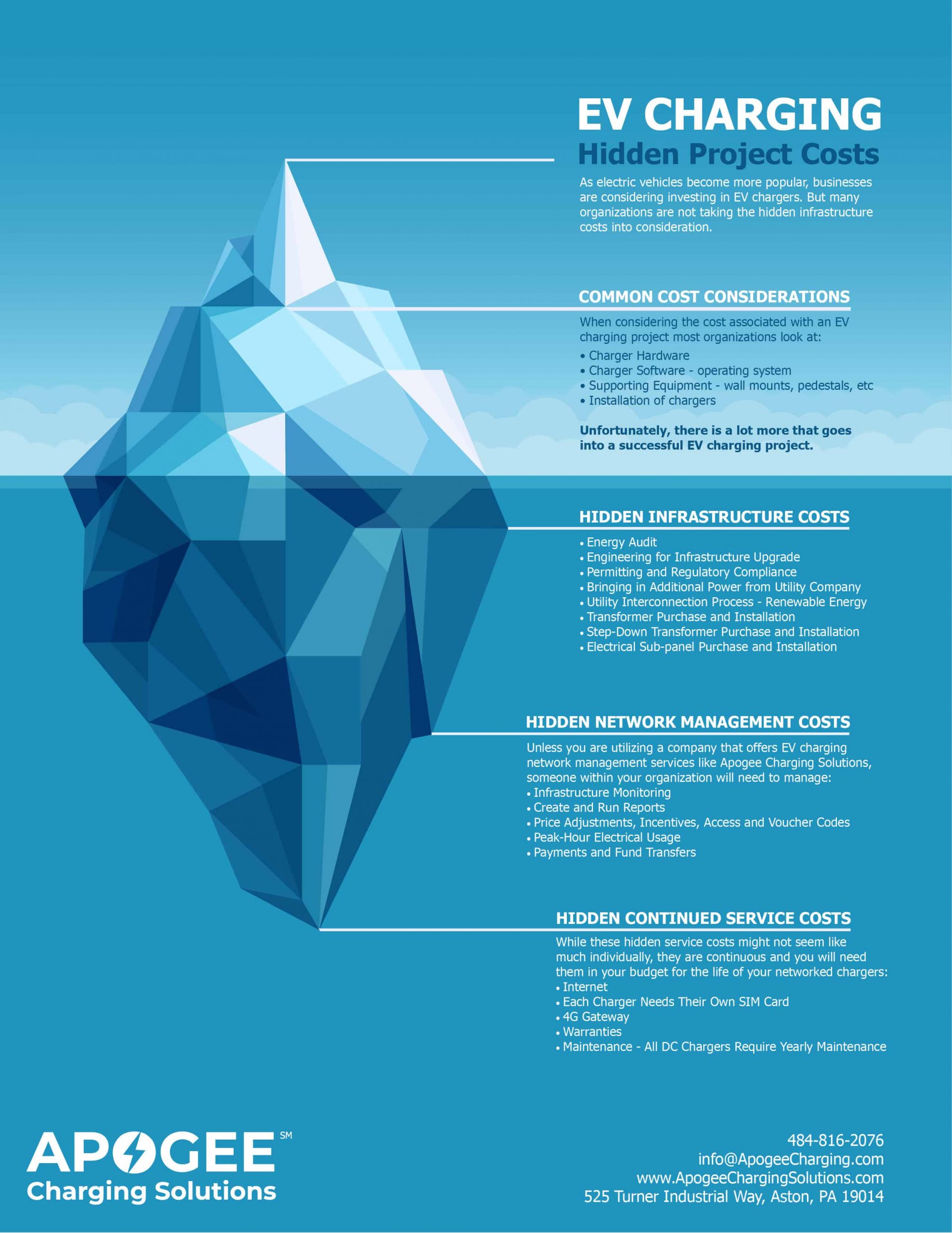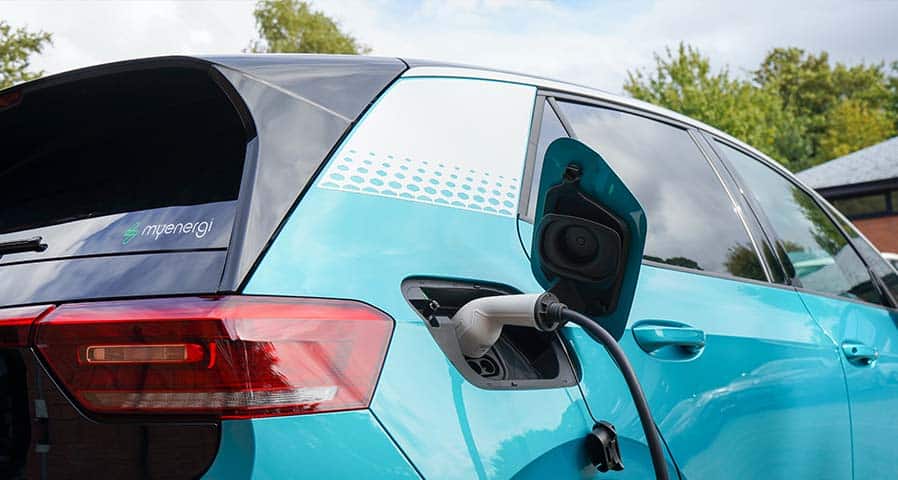Fleets, employees, and consumers require access to charging stations for their electric vehicles (EVs) and plug-in hybrid vehicles (PHEVs). Most drivers charge at home or the fleet depot, but many drivers also take advantage of public charging stations.
EV and PHEV drivers can also search for public and private charging stations with the Alternative Fueling Station Locator. Knowing the location of chargers can decrease range anxiety, a common concern with EV drivers.
Developing an EV charging infrastructure requires planning, and to properly plan you need to uncover any hidden EV charger infrastructure costs.
Open Charge Point Interface Terms
The EV charging industry uses a standard known as Open Charge Point Interface (OCPI) to determine a charging station hierarchy. It includes location, electric vehicle supply equipment (EVSE) port, and connector. The Station Locator and Alternative Fuels Data Center use the following terms:
- Station location: The address of the EVSE port/s. For example, a parking garage or shopping center lot.
- EVSE port: The port charges a single electric vehicle at a time. However, some chargers have multiple ports.
- Connector: The connector plugs into the electric vehicle during the charging sessions.
Charging Equipment
Consumers and fleets can choose between Level 1, (Level 1 chargers are being phased our and do not support an operating system) Level 2 AC Chargers, and Level 3 DC Fast Chargers. Multiple factors should be considered, before deciding on the type of station. Developing EV charging infrastructure means looking at networking and payment capabilities, along with maintenance and operation. Charging times are another factor that can affect your EV infrastructure decisions.
Level 1 Charging
- Approximately 5 miles of range per 1 hour of charging
- Uses a J1772 connector
- Does not support operating systems
Level 1 chargers provide electrical currents through a 120V AC plug. The chargers typically come with a cord set, so zero additional equipment is necessary. One end of the connector plugs into a standard three-prong household outlet. The other end plugs into the EV. Level 1 chargers are the least expensive and are commonly used in home charging infrastructure. With eight hours of charging, drivers can replenish around 40 miles of range. Level 1’s slow charging rates make them inefficient as public chargers. Less than 2% of public charging stations are Level 1 models, as of 2021.
Apogee Charging Solutions does not offer Level 1 chargers for commercial or home use. We do offer a level 2 home charger that affords homeowners commercial charging speeds at home. For networked Level 2 chargers, click here.
Level 2 Charging
- Approximately 25-30 miles of range per 1 hour of charging
- Uses a Tesla and J1772 connector
- Look for chargers that also come with a UL and Energy Star certification
AC Level 2 chargers are the most commonly employed for home, fleet, and public charging. The chargers are compatible with home 240V and commercial 208V outlets. The stations can charge a standard EV battery overnight, delivering up to 80 amps and 19.2 kW. A dedicated 40-amp circuit is required to meet the National Electric Code requirements.
Level 2 chargers use a J1772 connector. It’s compatible with all commercially available EVs manufactured in the U.S. Level 2 chargers are also compatible with all Tesla vehicles.
DC Fast Charging
- Approximately 100 to 200+ miles of range per 30 minutes of charging
- Uses a CCS, CHAdeMO, and tesla connector
- Look for chargers that also come with a UL and cETLus certification
Level 3 direct-current (DC) fast chargers comprise around 15% of public charging infrastructure. Their usage is expected to increase as more fleets transition to medium and heavy-duty EVs, as well as auto dealerships ramping up their sale of EVs.
DC fast chargers are available in three types to service a variety of electric vehicles. The three types of charging ports are SAE Combined Charging System (CCS), CHAdeMO, and Tesla.
CCS or J1772 connectors are unique since they are found on all three types of charging stations, Level 1, Level 2, and DC fast chargers. It helps ensure most EVs can take advantage of public and private fast charging stations.
The CHAdeMO connector is also compatible with most electric vehicles.
Tesla EVs come with unique connectors that can limit where drivers can charge their vehicles. While Tesla EVs do not have a CHAdeMO connector, vehicle owners can purchase an adaptor.
Procuring and installing an EV Charging Infrastructure
Research is crucial when you are developing an EV charging infrastructure, including requirements for procurement and installation. Chances are you are in the research phase now, and while the internet is flooded with electric vehicle and charger information, the actual electrical infrastructure requirements are vague.
Below you will find an infographic on the hidden costs of an EV charging project. There are substantial infrastructure investments needed for most EV charging projects and your EV charger installer or partner should discuss

Operation and Maintenance
EV charger owners and operators require training on operation and maintenance procedures and practices. Apogee Charging Solutions offers EV charging network management services that alleviate the need for additional staff.
Additional Charging Infrastructure Options
Commercial and industrial businesses are looking to invest in EV charging networks but are finding a lack of comprehensive information and knowledge surrounding their investment.
Our goal at Apogee Charging Solutions is to act as a partner and consultant for all of our clients. Our EV charger experts are available to answer any of your questions from product selection to electrical infrastructure concerns. Reach out to us today by calling 484-816-2076, emailing [email protected], or schedule a call that fits your need by clicking the button below.








0 Comments